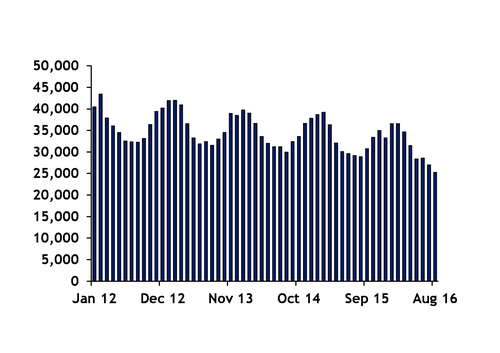UK power grid supply at record low in August
OREANDA-NEWS. September 02, 2016. Average power supply delivered to the UK grid was the lowest on record in August.
The increase in embedded generation capacity and improved energy efficiency measures combined to cut the amount of demand the transmission system was required to meet.
An average of just 25.2GW was delivered to the grid during all hours in August, including power imports via interconnectors, down from the previous low of 27GW recorded in July and down from an average of around 28.9GW in August last year.
The amount of supply required by the transmission system in order to meet demand has dropped sharply from 2011, when an average of 32.7GW was delivered to the grid during all hours in August.
August followed a trend seen throughout this year, with grid supply over the first eight months of the year averaging 31.1GW, compared with 33GW last year.
The UK's sharp growth in installed embedded generation capacity in recent years has meant that a greater proportion of the country's power demand has been met by the local distribution networks that such facilities feed their output into. This is especially the case over the summer months, when solar power output is at its highest, reducing the amount of power that the grid needs to supply during the peak hours of the day.
The UK's solar power generation averaged around 2.7GW during all hours in August, which was a new record — reflecting the continued growth in solar generation capacity — up from the previous high of 2.5GW recorded in both May and July this year.
Transmission system demand has also fallen in recent years following improvements in the energy efficiency of domestic appliances, as well as the steady deployment of smart energy technologies, which shift some of the demand away from peak hours. August is typically the month with the lowest demand anyway, owing to the holiday season.
The weaker demand for power from the grid this summer has almost entirely cut the requirement for unprofitable coal plants to operate, with the role of such facilities limited to operating during the peak hours or covering for supply shortfalls when renewable power generation is low.
Coal-fired power output averaged just 605MW over the whole of August, down from the previous all-time low of 965MW recorded in July. And coal plant output slumped to zero during several off-peak hours of the month, when they were not needed at all.
Gas-fired power output was also subdued, although combined-cycle gas turbine (CCGT) plants comfortably remained the country's largest source of power generation. CCGTs generated an average of around 10.8GW in August, which was down from 12.3GW in July and was the lowest monthly output level recorded since December last year.
Demand levels will be expected to pick up in September, as the holiday season comes to an end, but this is unlikely to result in any significant rise in demand for coal plants to operate. The September dark spread for a 38pc-efficient coal plant ended yesterday's session at around minus ?1.20/MWh (minus €1.43/MWh), leaving very little incentive for coal plant owners to run their facilities when they are not required this month.
The latest weather forecasts point towards temperatures across the UK remaining comfortably above seasonal norms through until at least mid-September, which should mean that the return of any significant heating demand is unlikely to come until October.
2663113
Average UK power grid supply MW





Комментарии